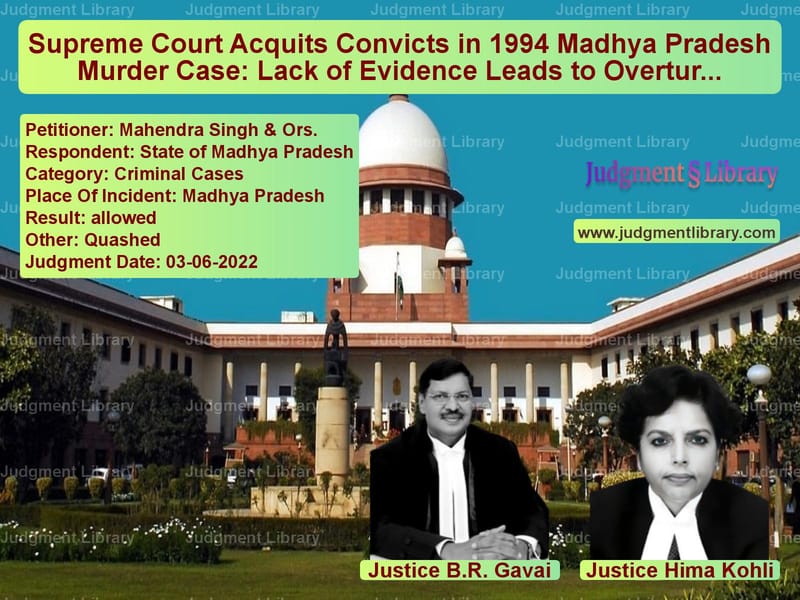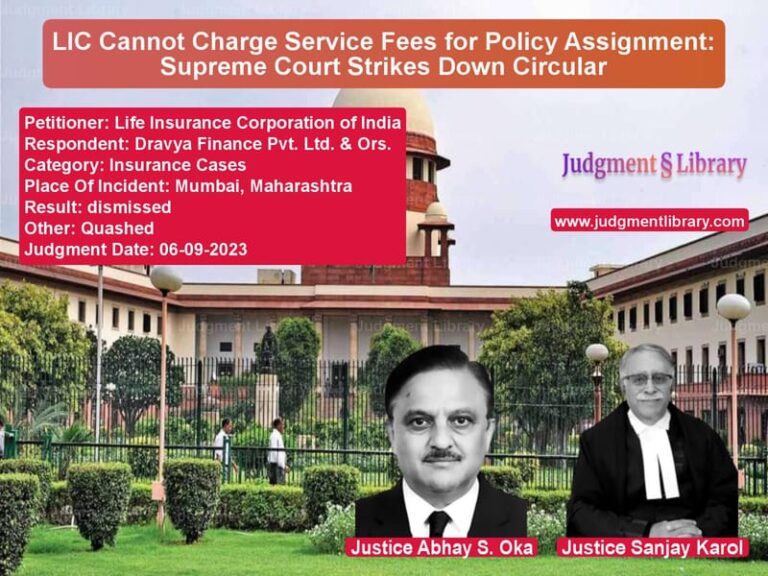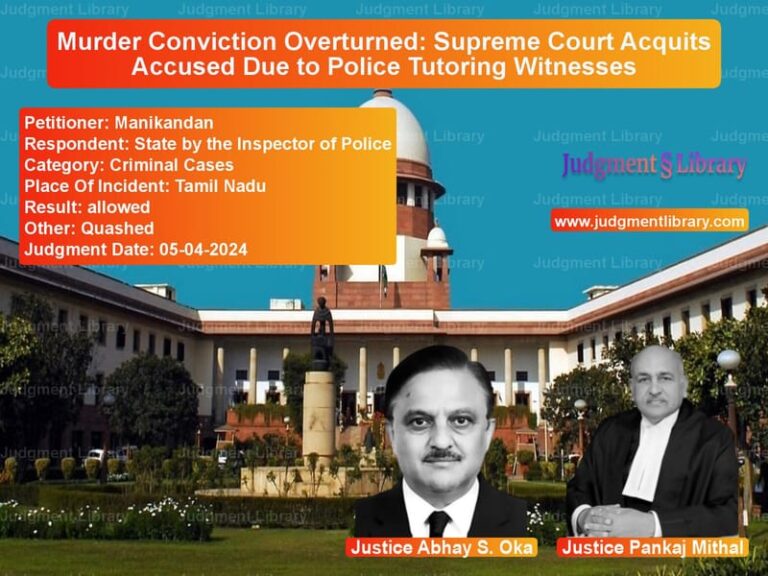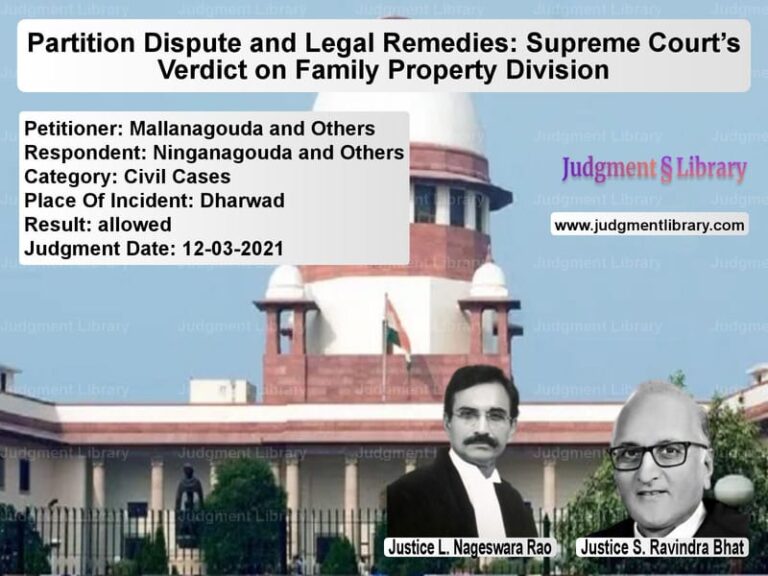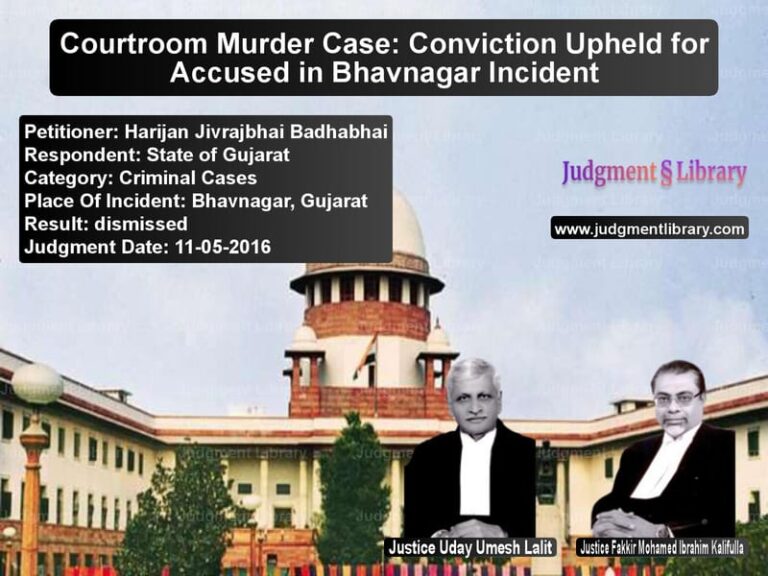Supreme Court Acquits Convicts in 1994 Madhya Pradesh Murder Case: Lack of Evidence Leads to Overturning of Life Sentence
The Supreme Court of India recently delivered a landmark judgment in the case of Mahendra Singh & Ors. v. State of Madhya Pradesh, where it acquitted four individuals who had been convicted for a 1994 murder case in Madhya Pradesh. The apex court overturned the Madhya Pradesh High Court’s ruling, citing insufficient evidence and unreliable witness testimony. This judgment reaffirms the fundamental principle that an accused is entitled to the benefit of the doubt unless guilt is proven beyond reasonable doubt.
Background of the Case
The case stems from an alleged attack that occurred on June 12, 1994, in a village in Madhya Pradesh. The prosecution’s case was that the victim, Bhagat Singh, was brutally attacked with a ballam (spear), iron rods, and wooden sticks by a group of individuals due to an ongoing enmity.
The First Information Report (FIR) was filed based on an oral complaint by Amol Singh (PW-6), who claimed to be an eyewitness. The police arrested several accused, but during the trial, six accused were acquitted due to lack of evidence, while four individuals—Mahendra Singh, Pritam Singh, Santosh, and Shambhu Singh—were convicted under Sections 148, 302 read with 149 IPC and sentenced to life imprisonment.
Trial Court Findings
The Trial Court heavily relied on the testimony of Amol Singh (PW-6), the only eyewitness, and convicted four individuals while acquitting others due to lack of evidence. The defense raised serious objections regarding the reliability of the witness and inconsistencies in the prosecution’s version of events.
High Court Proceedings
When the convicted individuals appealed to the Madhya Pradesh High Court, the High Court upheld the Trial Court’s decision on August 6, 2019. The High Court justified its decision on the following grounds:
- The eyewitness testimony of PW-6 was deemed credible and supported by medical reports.
- The High Court dismissed the delay in filing the FIR as inconsequential.
- The post-mortem report confirmed that the injuries sustained by Bhagat Singh were caused by the weapons described in the FIR.
Following this, the convicted individuals filed an appeal before the Supreme Court.
Arguments Before the Supreme Court
Petitioners’ (Appellants’) Arguments
The appellants contended that:
- The conviction was based solely on the testimony of PW-6, which was inconsistent and unreliable.
- The FIR was delayed without a proper explanation, raising doubts about its authenticity.
- The post-mortem report only established that the death was homicidal but did not link the injuries directly to the appellants.
- Several independent eyewitnesses were not examined, which weakened the prosecution’s case.
- The conviction relied on circumstantial evidence that did not establish guilt beyond reasonable doubt.
Respondent’s (State of Madhya Pradesh) Arguments
The State of Madhya Pradesh defended the conviction, arguing that:
- The testimony of PW-6 was credible and sufficient to convict the accused.
- The delay in filing the FIR was justified since the priority was to take the injured victim to the hospital.
- The post-mortem report corroborated the injuries mentioned in the FIR.
- The accused had a longstanding enmity with the victim, providing sufficient motive.
Supreme Court’s Observations
The Supreme Court extensively analyzed the evidence and made the following key observations:
“The prosecution has failed to establish its case beyond reasonable doubt, and the accused are entitled to the benefit of doubt.”
The Court referred to the principles laid down in Vadivelu Thevar v. State of Madras (1957), categorizing witnesses as:
- Wholly reliable – Conviction can be based solely on their testimony.
- Wholly unreliable – No conviction can be based on such testimony.
- Neither wholly reliable nor wholly unreliable – Corroboration is required.
The Court found that the prosecution’s key witness, PW-6, fell into the wholly unreliable category due to inconsistencies in his statements and contradictions with medical evidence.
Final Judgment
The Supreme Court ruled as follows:
- The appeal was allowed.
- The conviction and life sentence imposed by the High Court were quashed.
- The appellants were acquitted and ordered to be released immediately.
Conclusion
This ruling underscores the importance of reliable witness testimony in criminal trials. The Supreme Court reaffirmed that a conviction cannot be sustained solely on uncorroborated and inconsistent evidence, ensuring that legal principles are upheld to prevent wrongful convictions.
The case also highlights the significance of procedural safeguards in criminal law, emphasizing that courts must ensure that every conviction is supported by credible and legally admissible evidence.
Petitioner Name: Mahendra Singh & Ors..Respondent Name: State of Madhya Pradesh.Judgment By: Justice B.R. Gavai, Justice Hima Kohli.Place Of Incident: Madhya Pradesh.Judgment Date: 03-06-2022.
Don’t miss out on the full details! Download the complete judgment in PDF format below and gain valuable insights instantly!
Download Judgment: mahendra-singh-&-ors-vs-state-of-madhya-prad-supreme-court-of-india-judgment-dated-03-06-2022.pdf
Directly Download Judgment: Directly download this Judgment
See all petitions in Murder Cases
See all petitions in Judgment by B R Gavai
See all petitions in Judgment by Hima Kohli
See all petitions in allowed
See all petitions in Quashed
See all petitions in supreme court of India judgments June 2022
See all petitions in 2022 judgments
See all posts in Criminal Cases Category
See all allowed petitions in Criminal Cases Category
See all Dismissed petitions in Criminal Cases Category
See all partially allowed petitions in Criminal Cases Category

